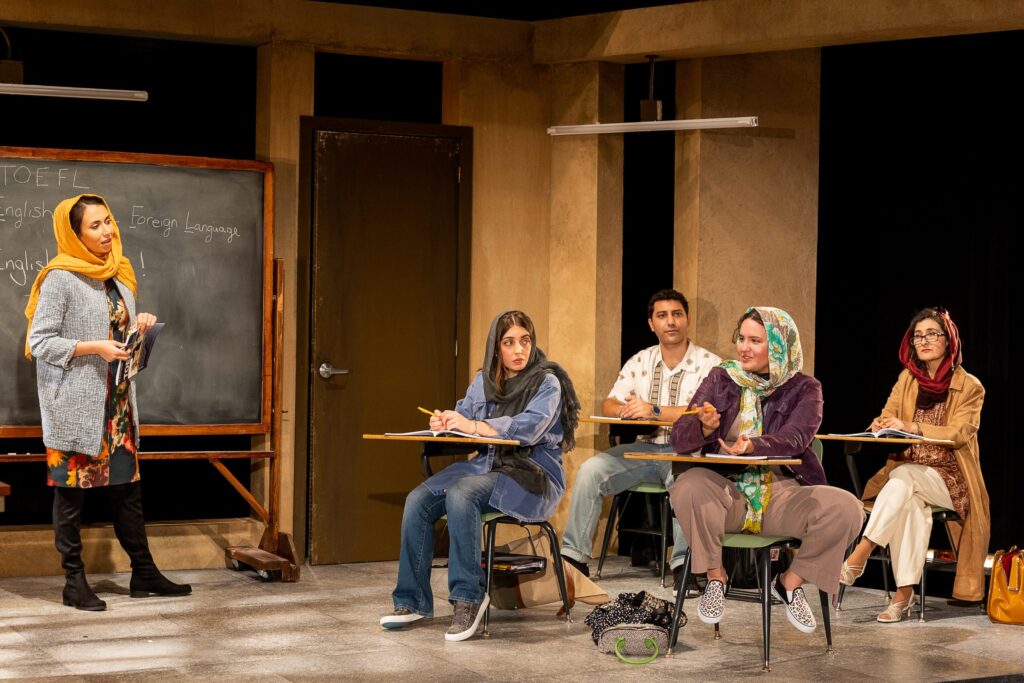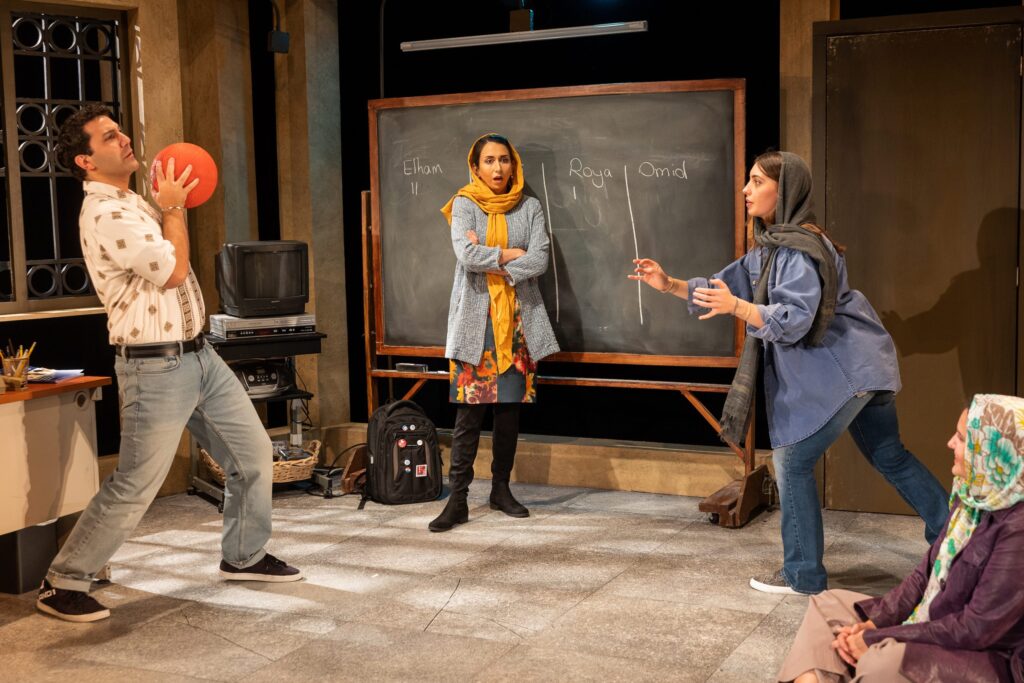
‘English’ –Sanaz Toossi, Playwright. Melory Mirashrafi, Director. Janie E. Howland, Scenic Designer. Nina Vartanian, Costume Designer. Amanda E. Fallon, Lighting Designer. Ash, Sound Designer. Emme Shaw, Props Designer. Presented by SpeakEasy Stage at the Roberts Studio Theatre, Calderwood Pavilion, Boston Center for the Arts, 527 Tremont St. Boston, through November 19, 2022.
by Shelley A. Sackett
SpeakEasy Stage’s production of Sanaz Toossi’s ‘English’ starts out simply enough. Four Iranian students are studying in Karaj for the Test of English as a Foreign Language Exam (TOEFL) , an English proficiency exam they must pass if they hope to pursue university study abroad, immigration and more. Their teacher, Marjan (a first-rate Deniz Khateri), rules her classroom with an iron fist. They will speak only English during class, and when anyone slips into Farsi, she posts a strike against them on her giant blackboard, practically snarling with scorn.
This is language immersion that is the equivalent of throwing a baby into the deep end to teach them to swim. Yet, her motive, at least in the beginning, seems pure and altruistic. She studied in Manchester, England, an experience that changed her life for the better and one she speaks of with near religious veneration. She believes that she and she alone can help her flock find this same path that opened her world, and she takes her role as their shepherd with the seriousness and zeal of a missionary.
[An effective and engaging scripted touch is that when the actors speak their native Farsi, they do so in fluent conversational English. When they practice English, their speech is more staccato, with a heavily accented cadence of a beginning foreign language student.]
Marjan insists her students leave their Iranian identities outside her classroom door. “English Only!” is underlined twice on the blackboard. The implication is clear — Farsi and all things Iranian are baggage that need to be shed if one is to “make it” in the global arena. “Speaking English is one of the greatest things two people can do together,” she coos, and she means it with all her being.
Her students don’t always agree. Roya (the splendid Layla Modirzadeh) needs to learn English so she can join her son and his family (including a granddaughter whose English name Roya can’t pronounce) in Canada, where they have emigrated and assimilated. She is the oldest of the students and the one with the longest and deepest roots in Iran.
When she learns that Marjan happily gave up her identity in England, letting others call her “Mary” for their convenience and ease, she chafes. People should not have to give up their names to learn a language, she says. “Our mothers get to name us. Not foreigners.”

Elham (compellingly played by the feisty Josephine Moshiri Elwood) has taken the TOEFL before and failed. More than the others, she needs to pass this test to pursue her goal of studying gastroenterology in Australia. In addition to her thick Farsi accent and lack of facility with languages, she faces two other barriers: she despises English and how her voice sounds when she speaks it, and she can’t stand Marjan and her autocratic ways. That Marjan deliberately humiliates and picks on her adds fuel to her hot-blooded flame.
Goli (Lily Gilan James, a senior at Boston Conservatory at Berklee) is a compliant and reticent 18-year-old who happily does as she is told. She is the least interesting, with no axe to grind and nothing to prove. She just wants to pass the exam so she can go to a university outside Iran.
On the other hand, 29-year-old Omid (Zaven Ovian) is an enigma. His English is better than the teacher’s, and he comes up with complex and specific vocabulary, like “windbreaker” during a word game. He and Marjan bond inside and outside class over their seeming shared love of all things foreign, but Omid has a secret he keeps tight to his vest until the play’s end. Ovian splendidly plays out the mystery.
Director Melory Mirashrafi, a first generation Iranian-American, makes the most of Janie E. Howland’s well-designed set and a script that at times moves slowly.
Playwright Sanaz Toossi (who won this year’s Lucille Lortel Award for “English”) takes her petri dish of varied and complex characters and, over 100 intermissionless minutes, seamlessly interweaves engaging theater with an existential examination of identity, heritage, assimilation and alienation.
She poses many important and timely questions. Is there is a tipping point at which the loss of cultural identity outweighs the materials of life in one’s non-native land? Is voluntary immigration something to be encouraged or grieved? What about the generations, like Roya’s granddaughter, who will grow up without hearing Farsi or understanding her cultural heritage?
Is it worth leaving your homeland voluntarily, Toossi questions, to forever be branded a foreigner with an accent, the “other” who will always be asked, “where are you from?” [Toossi’s mother immigrated to the U.S. from Iran in the mid-1980’s following the Iranian Revolution].
When Elham returns to the classroom after taking (and passing with 99%) the TOEFL, it is not to gloat or thank Marjan, but to offer by example a lesson of how you can gain English language proficiency without losing your Iranian soul.
“You are Iranian but your English is a lot of things. It wants to be American and some of the time British and now it does not know what it is. When I speak English, I know I will always be a stranger,” Elham tells Marjan. “I hear my home. What do you hear?” For tickets and information, go to: https://www.speakeasystage.com/

